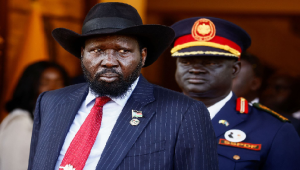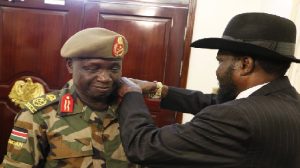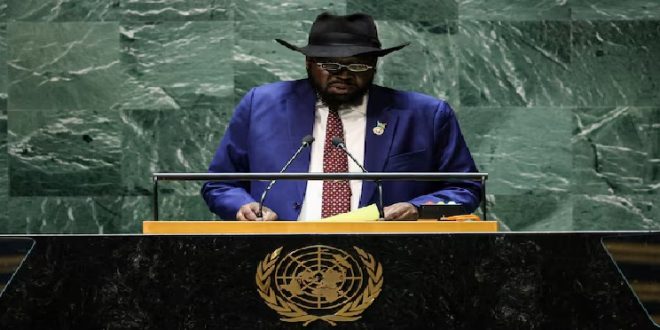05-10-2024
NAIROBI: South Sudan’s President Salva Kiir has dismissed the country’s long-serving intelligence chief, replacing him with a close ally, state broadcaster SSBC reported, citing a presidential decree.
The dismissal of Akol Koor Kuc, who had headed the controversial internal security bureau of the National Security Service (NSS) since the country’s independence from Sudan in 2011, came weeks after the transitional government announced yet another election delay.
 Last month Kiir’s office announced an extension of the transitional period by two years and postponed elections for a second time following a delay in 2022, drawing criticism from the United States and other international guarantors of the country’s peace process.
Last month Kiir’s office announced an extension of the transitional period by two years and postponed elections for a second time following a delay in 2022, drawing criticism from the United States and other international guarantors of the country’s peace process.
Calls to the government spokesperson and the office of the president were not answered.
Rights groups including Amnesty International and Human Rights Watch have long warned that the secretive NSS commands excessive power in the country, operating with impunity against civil society and activists who challenge the government.
Analsyts say the decision to sack the intelligence chief, announced late on Wednesday, reflects a power struggle at the highest levels of the government.
“There’s been a lot of reckoning in terms of what to do with Akol Koor. The president doesn’t want very rapid decisions to cause a problem with national security,” policy and security analyst Boboya James told Reuters.
“Now, with the extension of the peace agreement, he would want to consolidate power by beginning to bring loyalists” into government, James said.
The new intelligence chief, Akec Tong Aleu, is a close ally of Kiir.
South Sudan ended five years of civil war in 2018, but disagreements between Kiir and his deputy Riek Machar – who led the opposing sides in the conflict – have been major obstacles to completing the peace process.
 However, when the worst flooding in more than 50 years engulfed communities along the River Nile in South Sudan last year, thousands of people fled to higher ground, seeking refuge in an old army barracks.
However, when the worst flooding in more than 50 years engulfed communities along the River Nile in South Sudan last year, thousands of people fled to higher ground, seeking refuge in an old army barracks.
Known as Canal Village, it had been a strategic military position decades ago in northern Jonglei state, with the city of Malakal further along the Nile. But its new residents discovered, to their dismay that within its confines lay an old minefield.
Their predicament encapsulates the impact of a climate crisis on a country which is yet to recover from a brutal five-year civil war. A peace deal signed in 2018 has done little to stop endemic violence.
Those who had already been forced from their homes because of the conflict are again fleeing, with flooding, seen above near the town of Bentiu in Unity state, over the last four years becoming an increasing problem.
It is estimated that 2.2 million people, nearly 20% of the population, are internally displaced with the UN warning that up to 10 million will need food aid in 2023.
In order to help her family escape the waters that engulfed her village, Mary Nyantey (pictured above) tied her five children up in sheets of plastic usually used to cover homes from the rain. She swam and floated down river for a day dragging her precious sack behind her until she reached Bentiu.
The family are now in a camp there, but have no food and go to the river to harvest a plant called “yell”, which is what they are eating to survive.
The camp in Bentiu shelters more than 112,000 people and is erected on raised dykes. According to Joshua Kanyara. (Int’l Monitoring Desk)
 Pressmediaofindia
Pressmediaofindia




